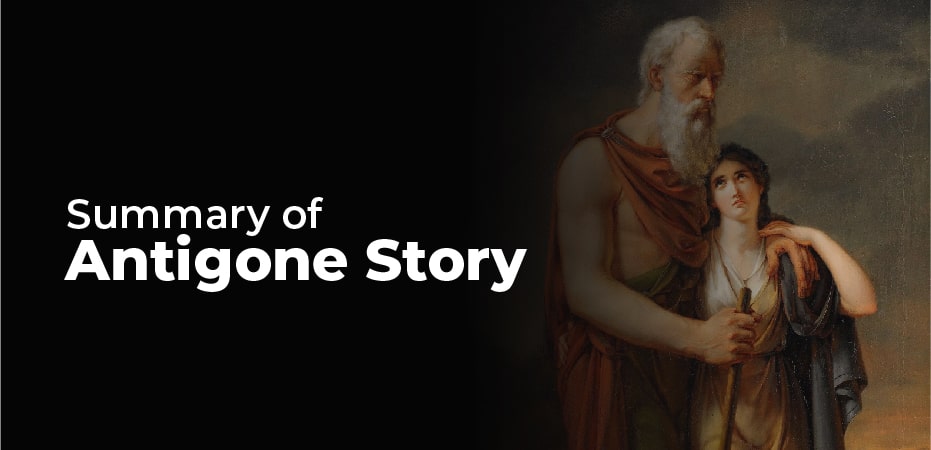Rosa Parks refused to give her seat up to a white person in the 1960s, which led to one of the biggest legal battles of that era. As much as that was a premeditated act of civil disobedience, the heroine in Antigone, a tragedy written by Sophocles around 441 BCE, makes a similarly difficult choice. She chooses to disobey the law and bury her brother not because she wants to make any grand political statement, but due to the fact that he is entitled to it.

Summary of Antigone Story:
The two brothers Polyneices and Eteocles, who led opposing sides in Thebes’ civil war, have both been killed in battle during this time. It has been declared by Creon, the new ruler of Thebes, that Eteocles will be honored while Polyneices will be disgraced. Unlike the rebel brother, the corpse of the rebel brother will not be sanctified by holy rites, and will lie unburied for the carrion animals to feed upon. The sisters of the dead brothers, Antigone and Ismene, are now the last descendants of Oedipus, who is destined to die at the end of the play. The first scene of the play opens with Antigone taking Ismene for a secret meeting outside the city gates late at night: Antigone wants to bury Polyneices’ body in defiance of Creon’s edict. Antigone decides to do the deed by herself even though Ismene refuses to help her fearing the death penalty, but Ismene is unable to dissuade her from doing the deed by herself.
Creon enters the room along with the Chorus of Theban Elders. It is he who seeks their support in these days to come, and he particularly wants them to support his edict regarding the disposal of Polynices’ body. We pledge our support. Upon entering, a Sentry reports that the body has been buried. The furious Creon orders the Sentry to find the guilty party or face death himself. The Sentry leaves, but returns after a short absence, bringing Antigone with him. She denies what she has done when Creon questions her. Creon confronts her unreservedly over the morality of the edict and her actions. As Creon becomes more enraged, he summons Ismene, thinking she must have helped her. The accuser, Ismene, tries to falsely confess to the crime, wishing to die with her sister, but Antigone will not allow it. The two women are briefly imprisoned by Creon.
Haemon, Creon’s son and Antigone’s fiance, enters to pledge allegiance to his father. Although he initially appears willing to obey Creon, when Haemon gently persuades his father to spare Antigone, the discussion deteriorates and the two men are soon bitterly insulting one another. Haemon leaves with a vow never to see Creon again.
Creon Decision:
Creon decides to spare Ismene and imprison Antigone in a cave instead. One last time, she bewails her fate and defends her actions as she is brought out of the house. As she is being taken away, the Chorus expresses great sorrow for what is going to happen to her.
He is immediately recognized as the blind prophet Teiresias. The gods support Antigone. It is Creon who accuses Teiresias of being corrupt, and Teiresias responds by telling Creon that since he left Polyneices unburied and put Antigone into the earth, he will lose one child. His sacrificial offerings will not be accepted by the gods, and all of Greece will despise him. A terrified Chorus urges Creon to take their advice. He agrees, and they tell him to bury Polyneices and free Antigone. After being shaken, Creon agrees. To correct his previous mistakes, he leaves with a retinue of men. The Chorus performs a choral ode to Dionysus, and then a Messenger enters to announce that Haemon has committed suicide. Creon’s wife and Haemon’s mother, Eurydice, enters and asks the Messenger for everything. Haemon and Antigone have both committed suicide, according to the Messenger. Eurydice has disappeared into the palace.
End of the story:
Haemon’s body is carried into the temple by Creon. Creon recognizes that he was responsible for these events. Creon and the Chorus are informed by a Second Messenger that Eurydice has committed suicide. Eurydice cursed her husband with her last breath. Having blamed himself for everything that has happened, Creon asks his servants to help him inside. Although he has kept the order he valued so much and is still the king, he has also lost his child and his wife due to his actions against the gods. While the gods punish the proud, punishment brings wisdom, says the Chorus.


